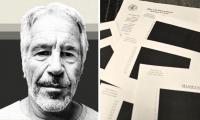KARACHI: Most of the health experts including pulmonologists, ENT specialists and the emergency medicine experts who attended and examined the Kemari gas tragedy patients, have rejected the claims that ‘soy allergy’ resulted in the deaths of 14 people and affected over 300 people while an association of ship agents that offloaded soybean cargo from a ship also rejected the reports that the ship’s cargo resulted in deadly incident. Meanwhile, 95 more patients visited several hospitals with respiratory distress. Also due to low tide, the ship suspected to be carrying the soybean consignment could not be moved to the Port Qasim.
Leading pulmonologists and ENT specialists discount the ‘soy dust allergy’ theory presented by the experts from University of Karachi claiming that most of the patients who were brought to different hospitals, were affected by some poisonous gas that damaged their respiratory system as many suffered from ‘convulsions’, some developed ‘pulmonary edema’ or fluid in the lungs while many had ‘metabolic acidosis’, which are symptoms of gas poisoning. “Most of the patients at the Emergency Room of the Jinnah Postgraduate Medical Center (JPMC) complained of difficulty in breathing and burning of eyes. "The condition of most of the patients indicated as if they had been exposed to some choking agent, some highly toxic gas that damaged their respiratory system and created problems in breathing”, said Dr. Yahya Tunio, the Deputy Director at JPMC while talking to The News on Tuesday. The hospital’s executive director, Dr. Seemin Jamali, also concurred with this hypothesis. Dr Jamali said a majority of patients were facing extreme difficulty in breathing and some of them were unconscious and were put on life support.
JPMC’s Deputy Director Dr. Yahya Tunio said allergic reactions can also lead to severe illness and ‘anaphylaxes’ or an acute allergic reaction can result in sudden death, but added that "most of the 82 patients received by the JPMC were in a condition as it they were exposed to some “choking agent”. “Pulmonary Edema or fluid buildup in the lungs, bronchospasm or suffocation, are the typical symptoms of exposure to some choking agents. Many lethal, toxic gasses can cause these symptoms and overexposure to such agents can lead to sudden death”, Dr. Tunio said adding that irritation of eyes is not found in patients with a severe allergy. According to chemical experts, chemical agents are usually of three types, including nerve agents that attack the nervous system, blistering agents and choking agents that cause suffocation and damage the respiratory system of the affected people.
Similarly, medical experts at the Ziauddin Hospital Karachi, which received the bulk of patients, also denied the allergic reaction as the likely cause of the deaths of 14 people and believed that some ‘industrial accident’ or mishandling of a toxic chemical resulted in the deadly incident and added that authorities were trying to cover up the incident. Top health experts including the Secretary General of PMA Dr. Qaiser Sajjad and Vice Chancellor of the Jinnah Sindh Medical University, Prof. Tariq Rafi also expressed their doubts on the ‘grain allergy’ theory, saying an extensive investigation should be carried out to ascertain the real cause of the tragedy.
On the other hand, Ship Agents Association & Stevedoring Conference said they strongly condemn the rumors targeting soybean cargo which was being discharged partly at Karachi Port Trust at berth no. 10/11 east wharf. In a statement, the association said the cargo was discharged only during the night of Sunday 16th February, 2020 (discharging commenced at 19:00 hours) and day of Monday 17th February 2020 (discharging stopped at about 22:00 hours). A total of over 600 labor worked on the ship and none were affected. This cargo is coming to the Karachi Port for the last many years and up till now, not a single incident has occurred. “When the cargo was being offloaded the wind direction was North East (NE) which means that it was towards Manora direction, not land. We wish to also point out that the first person who was hospitalized was even before the offloading from the ship commenced,” the statement said. The soybean is used to make edible oil and does not have chemicals in it. The Plant Protection department that visited the ship on 18th February 2020 with gas detectors to check for any harmful or toxic gases could not find any harmful gas. “We strongly recommend that this ship should not be shifted and cargo should be discharged at Karachi Port only. We confirm that we along with labor force of about 2 to 3,000 will stay at Karachi Port Trust berth during discharging operations. We must have the courage of our convictions”, the statement added.
Meanwhile,In the wake of the lingering crisis in the aftermath of the mysterious Keamari toxic leakage, a senior-level meeting, co-chaired by Federal Minister for Maritime Affairs Syed Ali Haider Zaidi and Provincial Minister for Local Government Sindh Nasir Hussain Shah, was held at the Karachi Port Trust Head Office here on Wednesday.
The meeting was attended by Commissioner Karachi Iftikhar Shallwani, Additional IG Ghulam Nabi, COS 5 Corps Brig Sami, Col IS 5 Corps Colonel Nasir, Rangers 90 Wing Lt Col Shabbir Nasser, MPA Shahnawaz Jadoon, DG SEPA Naeem Mughal, HEJ Dr Amir Haider, and Dr Shakil Ahmed, Marine Environment Specialist Rashid Yahya Usmani and other KPT senior officials, according to the Ministry of Maritime Affairs. The meeting expressed deep concern over the situation that affected over 200 residents of Keamari and its adjoining areas and also expressed grief over the loss of precious lives.
The environment experts, scientists, and representatives of the law enforcement agencies presented various options to address the crisis whereby as a precautionary measure the ship carrying Soybean has already been directed to shift to Port Qasim to offload the remaining cargo there. Furthermore, a committee was formed, headed by Commissioner Karachi Iftikhar Shallwani to ascertaining the root cause and determine the reasons for the incident. The committee may co-opt the services of experts and technical persons and give recommendations to avoid such incidents in the future. The said report will be submitted at its earliest. Meanwhile, the All Pakistan Solvent Extractors’ Association (APSEA) strongly deplores the baseless and unsubstantiated rumours in the media suggesting that the toxic gases originated from the soybean vessel berthed at KPT caused tragic deaths.
The APSEA said the vessel contains merchantable soybean of US origin and was shipped after usual stringent quality tests by the US Department of Agriculture. Upon arrival in Pakistan, the vessel was thoroughly inspected by the Department of Plant Protection that issued Release Orders for the cargo. Soybean is an agricultural commodity and contains no chemicals. It said on average, three soybean vessels call on the Pakistani ports every month for the last 5 years. No such problem was ever reported. As many as17 vessels were handled at KPT prior to this vessel, none caused any problems.
While sympathising with those affected by this tragedy, APSEA strongly urged the relevant authorities not to allow themselves to be misguided, and should carefully collect and forward facts only in the interest of the general public.















